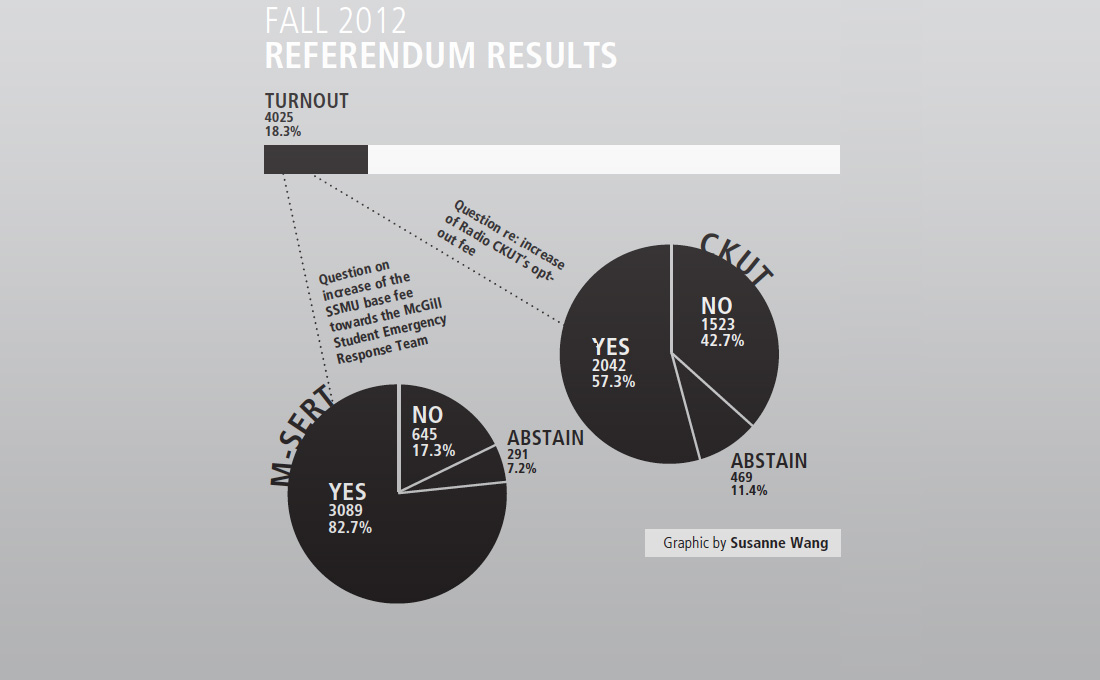Last Sunday, Elections SSMU released the results of the 2012 Fall Referendum period for the Students’ Society of McGill University (SSMU). Students voted in favour of fee increases for both CKUT Radio and the McGill Student Emergency Response Team (M-SERT).
CKUT
With 57.3 per cent of students voting in favour of its referendum question, CKUT will benefit from a $1 increase in its opt-outable student fee, beginning in January 2013. According to Carol Fraser, chair of CKUT’s Board of Directors, the current $4 fee has not increased or been indexed to inflation since 1988. She said the fee would go towards the station’s current priorities, including covering their deficit, rent, equipment repairs, and staff salaries.
“This means CKUT will continue to be an amazing community and campus resource, and its international prestige will be maintained,” Fraser said. “It means we can basically continue the work we are doing now … this win helps the station stay afloat and stay awesome.”
Fraser said she was grateful for the station’s supporters during the referendum and throughout the past year. CKUT has run three referendum questions in the last 12 months. Last semester, a question asking for its fee to become non-opt-outable failed to pass.
Fraser suggested that students supported this Fall’s referendum question because the fee will remain opt-outable. She suggested that many students use the opt-out system or agree with it in principle. According to Fraser, the nature of the group’s campaign also contributed to its success.
“We have done a lot of outreach to students this semester,” she said. “It is also CKUT’s 25th anniversary. Students have recognized that their station has been going so strong on such a small fee, [and] they were willing to open their hearts and minds and give more.”
M-SERT
M-SERT’s student fee will also increase next semester, after 82.7 per cent of students voted in favour of the $0.50 increase for all students studying at the downtown campus.
M-SERT Vice-President Finance Patrick Tohill said the team is excited and relieved by the results.
“I think our greatest concern was that the referendum would not reach quorum,” Tohill said. “Thankfully, we had some great campaigning going on to get the word about the referendum questions, and I also think the incentives for voting and advertising done by Elections SSMU probably helped a lot.”
According to Tohill, the additional money will go towards improving the quality of M-SERT’s equipment and of the first-aid courses M-SERT offers to the McGill community. The service also hopes to reduce the financial burden on M-SERT volunteers—who pay for their own training, uniforms, and meals while on shift—and expand student coverage and hours of operation. Tohill added that the campaign period also allowed M-SERT to raise awareness of the group’s existence.
“I think one thing this referendum may have revealed to us is that there is a significant amount of students who don’t know who we are or what we really do,” he said. “I hope we can take the momentum of this referendum result and promote M-SERT as a relevant and useful service for as many students as we can.”
Voter turnout
This referendum period saw 18.3 per cent voter turnout from students. Although it exceeded the 15 per cent quorum for referenda, voter turnout has decreased since last year. For example, 24.7 per cent of SSMU members voted in the Fall 2011 referendum period.
SSMU Chief Electoral Officer Hubie Yu suggested that voter turnout may have been comparatively low because the issues raised were not as contentious as some of last year’s had been. For example, CKUT’s question requested an increase in their student fee, rather than making their fee non-opt-outable. Yu also noted that the there was less discussion on campus about these issues because students did not establish a ‘No’ committee for either question.
“If anything, we tried to increase turnout this time … by having a gift card raffle for people who voted, [which is] something Elections SSMU used to do,” Yu said. “While our turnout isn’t where we wanted [it to be] … I think we did well, given the circumstances.”
Fraser said CKUT was happy with the voter turnout, but expressed concern that some students had trouble accessing the link to the online voting system.
“[Voter turnout] could have been higher if the SSMU voting system were a little more user-friendly—if you could simply go to a link, as in years past, instead of having to receive an email,” she said. “This made getting the vote out a bit harder.”
Yu expressed hope that the online voting system would be improved to facilitate student participation in the Winter referendum period. She also said Elections SSMU will use other methods to address voter turnout next semester.
“We’re definitely going to keep pushing to increase turnout next semester, and will probably do the gift card draw, [or] give free food or items to people who vote to make elections more exciting,” Yu said. “A lot of emails I receive from students [say] that all we do is run ‘popularity contests,’ or that people … don’t know who to vote for when they walk by our polling stations, so we’re really hoping to change that perception.”







